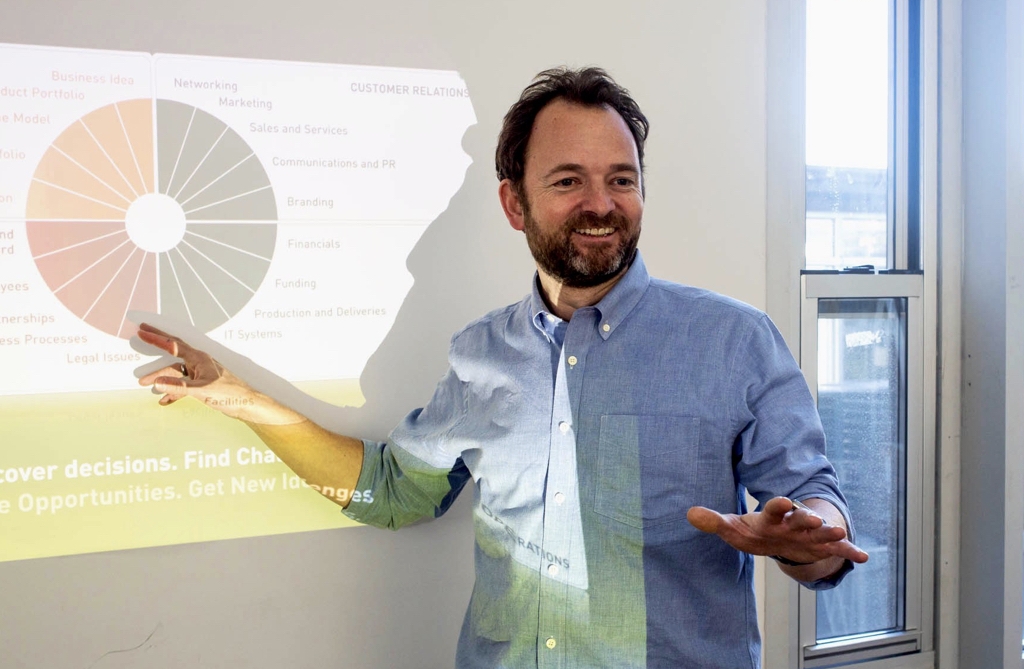David's most popular talks
David Madié, CEO and Founder of GrowthWheel International Inc., is a frequent guest speaker at industry conferences doing talks about economic development, incubation and best business advisory practices.
Balancing the Scorecard
—From measuring results to measuring the process that creates results
The results and economic impact from an incubation or small business support program is mostly measured by growth in revenue or profit, number of new employees hired, or amount of raised capital.
However there are some challenges with these metrics, because companies can be in great progress without this showing up in such metrics: Profit can be low if the company is investing. Revenue can be low if the company focus on product development before sales kick off. No. of new employees can be low if the company use outsourcing and vendors. And invested capital/lending can be low if the company don’t need investments.
This is why program managers might consider some alternative metrics that are focused on measuring the processes that creates results. Such measures will be possible to monitor even before the results show up.
The talk will showcase how one of the leading incubators in South Africa l, Innovation Hub, have applied such metrics in supplement to traditional metrics required by funders.
Take away from this talk which participants can implement in their program is:
- Ideas for new metrics that can immediately be used to track client progress
- Inspiration from a case study with an incubator using a grade style approach
- Practical techniques to make own tracking systems for new metrics
Becoming a "Trusted Advisor"
—How to build credibility with client companies by applying 3 different advisor styles
Earning the status of a trusted advisor is someting you can hope to become with your clients,
but it’s also something you need to become if you are going to make real impact. Being a trusted advisor means that you can attract the right client, have clients share their problems, and get their attention and influence them.
In this talk we will look at what it takes to become a trusted advisor and what we can do to achieve this by working on personal branding skills, using empathy and demonstrate professionalism.
A specific question to be explored is three various roles of an incubator manager or small business advisor can play in relation to client companies: The advisor bringing solutions. The coach asking questions or the Facilitator guiding the process.
The take away from this talk which participants can implement in their program is:
- A vision for the relationship between advisors and client companies
- A roadmap to become a trusted advisor to client companies
- A framework for applying various advisory styles to the situation
Designing Workshop Programs
—How to attract clients, improve service, or make income with action-oriented workshops
Organizing incubator workshop programs have several advantages, including attracting new clients, offering an improved service or generating additional program income. But performed the right way a workshop series can also be the best possible way to facilitate peer-to-peer learning for entrepreneurs.
In this talk we will look at the 6-step process of designing a workshop program: 1) selecting topics for the curriculum or workshop program, 2) develop or compile the workshop content, 3) designing the workshop course materials, 4) outline the workshop time schedule. 5) producing instructor scripts and slides notes and 6) produce marketing materials and social media content.
As an example the talk will show case the GrowthWheel Entrepreneurial Curriculum which has 20 workshops in 4 our formats, used by incubators and other entrepreneurship professionals in 32 countries. Principles of this workshop design can be applied with any other program and with different content.
The talk will include case studies of how this program has been adapted by organizations in states across the US and generated program income up to $20.000. Cases will include examples from Wisconsin, South Carolina, Tennessee and Arizona,
Take away from the talk which participants can implement in their program is:
- A template project plan for implementing a workshop program
- List of alternative workshop titles and suggested outlines for workshops (as handout)
- Ideas for integrating workshop training with one-to-one sessions
Agile Business Development
—The Horizon Beyond the Lean Startup and the Business Model Canvas
Tools and practices from the Lean Startup, Business Model Canvas are part of a the paradigm shift that over the last 5 years have changed the way incubators are helping client companies to develop their business models through creative exploring and systematic experimentation.
But what if the next horizon for this paradigm shift is about how companies are build and run?
In this talk we will look at how the agile approach to defining a business model might also be used after the business model is selected and the company is in operational mode.
The key question we will explore is whether the agile principles and practices that have shown to be effective software development can also be applied to businesses. After all, both a complex software development process and a business development proces have this in common that the end product can not always be predicted, and an attempt to do it might result i vast waste of resources.
Take away from this talk which participants can implement in their program is:
- A language to speak about agile principles to be used in business
- Inspiration to use ‘sprints’ as a tool for client company growth
- Specific ideas for applying agile practices in one-to-one sessions















